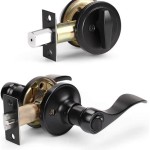Is Glass Cleaner Safe For Car Interiors?
Maintaining a clean car interior contributes to the vehicle's longevity and provides a more pleasant driving experience. While glass cleaner is a common household item often used for various cleaning tasks, its suitability for car interiors requires careful consideration. Different materials react differently to cleaning agents, and using the wrong product can lead to damage.
Automotive glass cleaner is formulated specifically for use on vehicle windows, designed to effectively remove grime, road film, and insect residue without leaving streaks. Its composition typically includes ammonia, alcohols, and surfactants. While effective on glass, these ingredients can be detrimental to certain materials commonly found in car interiors.
One primary concern is the potential damage to tinted windows. Ammonia-based glass cleaners can cause tinted film to discolor or bubble, diminishing its effectiveness and aesthetic appeal. Non-ammonia-based glass cleaners are available and are generally considered safer for tinted windows. However, it's always advisable to test any cleaning product on a small, inconspicuous area first to ensure compatibility.
Modern car dashboards often consist of various materials, including vinyl, plastic, and leather. These materials can be susceptible to damage from harsh chemicals. Ammonia, a common ingredient in many glass cleaners, can dry out and crack vinyl and plastic surfaces over time. This can lead to a faded, brittle appearance and compromise the integrity of the dashboard.
Leather upholstery requires specific care and is particularly vulnerable to damage from improper cleaning. Glass cleaners, especially those containing ammonia, can strip the natural oils from leather, leading to drying, cracking, and discoloration. Dedicated leather cleaners and conditioners are formulated to clean and protect this delicate material, maintaining its suppleness and preventing damage.
Navigation screens, infotainment systems, and other electronic displays within the car demand gentle cleaning. Harsh chemicals found in some glass cleaners can damage these sensitive components. Using a soft microfiber cloth slightly dampened with water is generally sufficient for cleaning these surfaces. Specialized electronics cleaners are also available for more thorough cleaning, but it's crucial to ensure they are compatible with the specific devices.
Interior fabric upholstery, including cloth and synthetic materials, can also be negatively affected by glass cleaners. Ammonia and other harsh chemicals can cause discoloration, staining, and even damage the fibers of the fabric. Upholstery cleaners specifically designed for automotive fabrics are the recommended choice for cleaning these surfaces.
Beyond the immediate damage, some glass cleaners can leave a residue that attracts dust and dirt, potentially accelerating the soiling of interior surfaces. This residue can also create a hazy film on windows, impacting visibility. Using a dedicated automotive glass cleaner can minimize this risk.
When cleaning car interiors, employing a microfiber cloth is generally recommended. These cloths are highly effective at trapping dirt and dust without scratching delicate surfaces. Using abrasive cloths or paper towels can create micro-scratches on interior components, diminishing their appearance over time.
Several alternatives to glass cleaner exist for cleaning car interiors. A mixture of mild dish soap and water can be effective for cleaning many surfaces, including vinyl, plastic, and even glass. However, it's important to use a minimal amount of soap and rinse thoroughly to avoid leaving a soapy residue. Dedicated interior cleaners are also available, formulated to clean and protect various interior materials without causing damage.
For cleaning leather, specialized leather cleaners and conditioners are recommended. These products are designed to clean the leather without stripping its natural oils, preserving its suppleness and preventing cracking. Regular conditioning helps maintain the leather's moisture balance and protects it from damage.
Preventing spills and promptly addressing any stains is crucial for maintaining the cleanliness and integrity of car interiors. Regular vacuuming and dusting can also help prevent the buildup of dirt and grime, reducing the need for frequent deep cleaning.
In conclusion, while glass cleaner may be effective for cleaning car windows, its use on other interior surfaces should be approached with caution. The potential for damage to sensitive materials like leather, vinyl, and plastics outweighs any perceived cleaning benefits. Utilizing appropriate cleaning products and techniques designed specifically for car interiors will contribute to the vehicle's longevity and preserve the quality of its interior components.

Dash Glass Protectant Car Window Cleaner Interior Cleaning

Dash Glass Protectant Car Window Cleaner Interior Cleaning

Rain X Interior Detailer

How To Clean Your Car Interior Like A Pro 3d Care

Dash Glass Protectant Car Window Cleaner Interior Cleaning

Tips On Maintaining Your Cars Interior W Invisible Glass Power Clean Detailer

Dash Glass Protectant Car Window Cleaner Interior Cleaning

Hydrosilex Glass Cleaner 250ml Safe On Interior And Exterior Dolphinaccessories

Turtle Wax Quick Easy Dash Glass Interior Cleaner 23oz Car Bicycle Care S Horme Singapore

Dash Glass Protectant Car Window Cleaner Interior Cleaning
Related Posts








